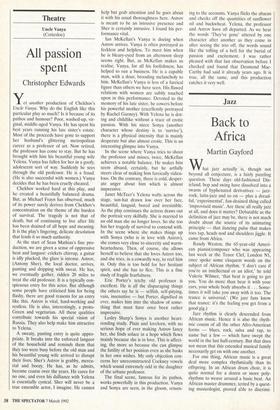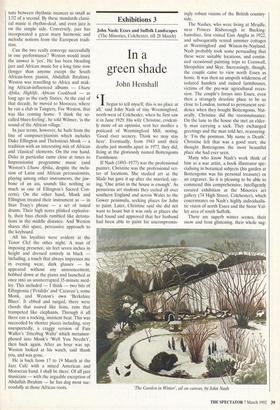Jazz
Back to
Africa
Martin Gayford
What jazz actually is, though not beyond all conjecture, is a fairly puzzling question. These days old-fashioned Dix- ieland, bop and swing have dissolved into a swarm of hyphenated derivatives — jazz- rock, latin-jazz and so on — plus a dread- ful, 'experimental', fun-drained thing called 'improvised music'. Are these all really jazz at all, and does it matter? Debatable as the definition of jazz may be, there is not much doubt about the source of its animating principle — that dancing pulse that makes toes tap, heads nod and shoulders jiggle. It came from Africa.
Randy Weston, the 65-year-old Ameri- can pianist/composer who was appearing last week at the Tenor Clef, London Ni, once spoke some eloquent words on the subject of African rhythm. 'I don't care if you're an intellectual or an idiot,' he told Valerie Wilmer, 'that beat is going to get you. You do more than hear it with your ears, your whole body absorbs it. . . Some- times it will take you away with it too. The trance is universal.' (We jazz fans know that trance: it's the feeling you get from a good gig.) Jazz rhythm is clearly descended from African music. Hence it is also the rhyth- mic cousin of all the other Afro-American forms — blues, rock, salsa and rap, to name but a few — which have swept the world in the last half-century. But that does not mean that this extended musical family necessarily get on with one another.
For one thing, African music is a great deal more complex rhythmically than its offspring. In an African drum choir, it is quite normal for a dozen or more poly- rhythms to weave around a basic beat. An African master drummer, tested by a quest- ing musicologist, proved able to discrimi- nate between rhythmic nuances as small as 1/32 of a second. By these standards classi- cal music is rhythm-deaf, and even jazz is on the simple side. Conversely, jazz has incorporated a great many harmonic and melodic notions from the European tradi- tion.
Can the two really converge successfully in one performance? Weston would insist the answer is 'yes'. He has been blending jazz and African music for a long time now (longer than anyone except the South African-born pianist, Abdullah Ibrahim). Weston was travelling to Africa and mak- ing African-influenced albums — Uhuru Afrika, Highlife, African Cookbook — as long ago as the early Sixties. At the end of
that decade, he moved to Morocco, where he ran a club in Tangiers. For Weston, that was like coming home. 'I think the so- called blues-feeling', he told Wilmer, 'is the sound of the African village.'
In jazz terms, however, he hails from the line of composer/pianists which includes Duke Ellington and Thelonious Monk — a tradition with an interesting mix of African and 'classical' elements. On the one hand, Duke in particular came close at times to
Impressionist programme music (and Weston's Uhuru Afrika, despite the inclu-
sion of Latin and African percussionists, playing among other instruments, the jaw- bone of an ass, sounds like nothing so much as one of Ellington's Sacred Con- certs). On the other hand, Monk and Ellington treated their instrument as — in Stan Tracy's phrase — a set of tuned drums. Their high notes plinked explosive- ly, their bass chords rumbled like detona- tions in the middle distance. And Weston shares this spare, percussive approach to the keyboard.
All his loyalties were evident at the Tenor Clef the other night. A man of imposing presence, six feet seven inches in height and dressed entirely in black — including, a touch that always impresses me in evening wear, dark glasses — he appeared without any announcement, bobbed down at the piano and launched at once into an uninterrupted 35-minute med- ley. This included — I think — two bits of Ellingtonia (Perdido' and !Caravan), some Monk, and Weston's own `Berkshire Blues'. It ebbed and surged, there were chords that roared like lions, runs that trumpeted like elephants. Through it all there ran a rocking, insistent beat. This was succeeded by shorter pieces including, very unexpectedly, a craggy version of Fats Waller's `Jitterbug Waltz' which metamor- phosed into Monk's 'Well You Needn't', then back again. After an hour was up, Weston looked at his watch, said thank you, and was gone.
He is back from 17 to 19 March at the Jazz Café with a mixed American and
Moroccan band. I shall be there. Of all jazz musicians — with the arguable exception of Abdullah Ibrahim , he has dug most suc- cessfully at those African roots.



















































 Previous page
Previous page